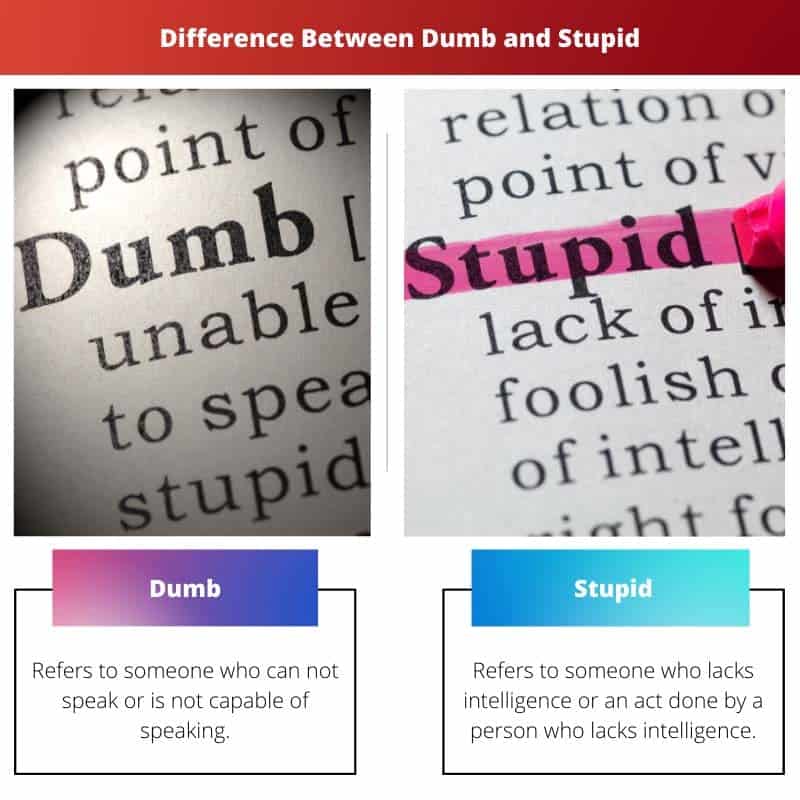Understanding books written in old English is challenging for people dwelling in the present world. It is not easy to comprehend the writings of an old book or an old writer and what the writer wants to convey.
For example, according to the old English language and vocabulary, silly was used to refer to being blessed and worthy. But now, silly is used to refer to foolishly.
Key Takeaways
- Dumb refers to a lack of intelligence or cognitive ability, while stupid refers to a lack of judgment or common sense.
- Dumbness is perceived as a condition that cannot be changed, while stupidity can be corrected through learning and experience.
- Dumbness is a neutral term, while stupidity is considered an insult.
Dumb vs Stupid
“dumb” means being temporarily speechless or unable to speak, a usage originating from its old meaning referring to the inability to speak. “Stupid,” however, solely refers to a lack of intelligence or poor understanding.

Dumb refers to a person who permanently lacks intellectual skills and does not improve over time. Dumb is used on a very informal basis. And it is used within a group of close companions very frequently.
Stupid refers to a person who commits an instantaneous mistake. It is used temporarily and not used to refer someone permanently. Stupid is used less frequently.
Comparison Table
| Parameters of Comparison | Dumb | Stupid |
|---|---|---|
| Adjective | Refers to someone who can not speak or is not capable of speaking. | Refers to someone who lacks intelligence or an act done by a person who lacks intelligence. |
| Meaning (s) | As a verb, it refers to “silence.” | As a noun, it refers to “stupid person,” and as an adverb means the term “extremely.” |
| Parts of Speech | Verb and adjective. | Noun, adjective, and adverb. |
| State | Dumb refers to someone who permanently lacks skills and does not change over time. | Stupid refers to someone for an instantaneous mistake and is not used to refer to someone permanently. |
| Frequency | Used frequently. | Used less frequently. |
| Reference | Physical disability of not being able to speak. | Stupid does not refer to any such physical disability. |
| Example | The whole family thought Edward is dumb, but later, he proved himself to everyone. | Even intelligent people sometimes act stupid. |
What is Dumb?
The term dumb refers to someone who can not speak or is not capable of speaking. Dumb can also be used as a verb referring to silence. The usage of dumb in English can be done by verb and adjective.
In the present scenario, dumb is used for people who are impaired in hearing. Dumb is used in an informal way of using.

What is Stupid?
Stupid refers to a person lacking intellectuality and intelligence. However, it also refers to the actions done by a stupid person.
A stupid person can make the right decisions but repeatedly make the same mistakes unknowingly. They are incapable of learning from their prior mistakes or experiences.

Main Differences Between Dumb and Stupid
- Dumb refers to a physical disability of not being able to speak. However, stupid does not refer to any such physical disability.
- An example of a sentence using dumb is, ” The whole University thought Bella was dumb until she topped University Examinations. ” Whereas the example of a sentence using stupid is, ” Edward’s decision of giving the resignation showed how stupid he can be”.

- https://books.google.com/books?hl=en&lr=&id=xtmQCzIeqTMC&oi=fnd&pg=PR5&dq=dumb+and+stupid&ots=1SsWv6JmYg&sig=YYR16A3fMHFZmMi8wfTf5osBUcc
- https://www.alife.org/wp-content/uploads/2013/08/collections_ECAL93-1090-1103-Webb.pdf

This article resonates with me, I make these two terms synonymously and don’t think of the different origins of the words.
I’ve also made the same mistake, this article was enlightening.
I agree, I’ve used these two terms interchangeably, but now I understand the differences.
This post seems a little too simple for something that is so complex, the explanation should be more nuanced.
This might be a good starting point for a reader who knows nothing about old English, but I agree that it could be more in depth.
This article is very helpful for those who have no idea about old English and its uses. It also gives us the modern perspective on old English terms used.
Exactly, it’s always insightful to learn the background of different word meanings, it can help expand our vocabulary and broaden our perspective.
The examples used to illustrate the differences are very helpful, they provide a tangible understanding for the readers.
The usage of examples make the distinction clear.
I think so too, the examples add a lot of value.
I’m not sure what the point of this article is, it seems pretty useless.
This article provided substantial insights.
I think this is a valuable elucidation.
The table comparison at the end of the article, provides a good comparison between dumb and stupid. It simplifies a convoluted issue and makes it easier to understand.
Yes, the comparison table is very useful for the reader to understand the differences easily.
This is an interesting and well-researched article.
Very informative.
Agreed, this is a thought-provoking piece.
Interesting take on old English terminology.
Yeah, I’ve never thought about these words that way!
The author does a great job at simplifying a complex topic.
Yes, the author did a great job at making the topic more accessible.
I think the tone of the article is a bit too pretentious.
The article could use more light-heartedness.
I agree, the article doesn’t seem down-to-earth.